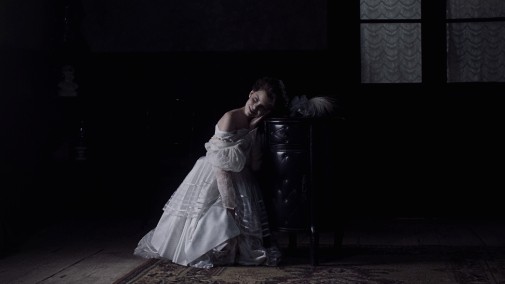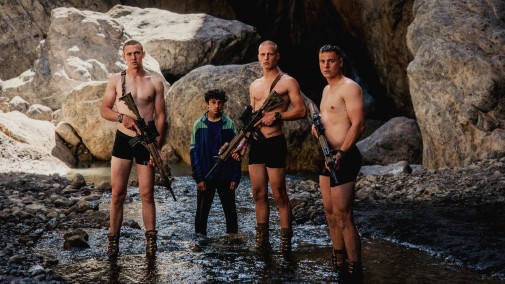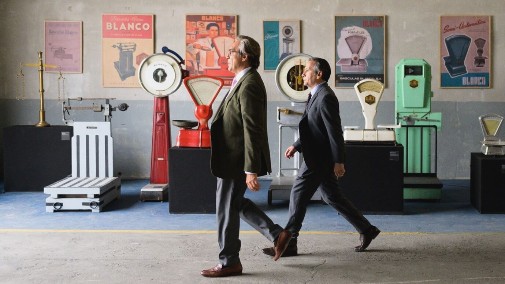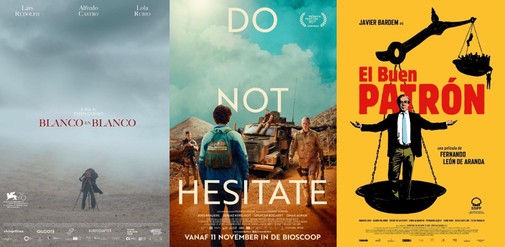Best International Film: Chile, Netherlands, Spain
 Sunday, December 12, 2021 at 2:00PM
Sunday, December 12, 2021 at 2:00PM I'm pleased to bring you the annual grouped reviews of the less high profile submissions for Best International Film Oscar. Many major contenders have already been reviewed (check the end of this article for links), but others remain unexamined. With 93 titles to consider, that's bound to happen. So as we wait for December 21st, when the Academy announces its 15-wide shortlist for this particular race, let's take a look at some of those submissions, starting with three previous champions from the category's history.
Chile won once before, while the Netherlands has three Oscars, and Spain counts four previous victories. This year, they submitted a portrait of colonialism, a drama about war's hell, and a dark comedy starring an Oscar-winning international star…

WHITE ON WHITE (Chile)
When you witness horrible things and do nothing, are you partially to blame for their existence? Passive observation can be a slippery slope, a means to perpetuate the status quo that tacitly inoculates its perpetrator of direct blame. At a certain point, though, active evil becomes indistinguishable from watchful acquiescence. Théo Court's White on White explores such questions through the camera, both the movie camera and the camera inside the narrative. After all, this is the story of a photographer, Pedro, who arrives in the early 20th century Tierra del Fuego with his camera, ready to capture the portraits of a powerful landowner and his child bride.
Played by Alfredo Castro, he's an insidious non-entity, focused on getting the perfect shot without considering what's in front of the lens. An early scene finds him directing a young girl to project sensuality through a confection of antique lace. He loosens the wedding gown, shows off her bare shoulders, sexualizing the child in a way that reveals his own lust. Such desires get him in trouble with his employer, forcing Pedro to become the recorder for the other man's savagery. He photographs the land, and its resources, every piece of property, including indigenous people treated like cattle, like pests to be exterminated by white hunters.
White on White thus becomes a meditation on genocide, horrible histories frozen in careful compositions whose beauty denounces intrinsic inhumanity. Languorously paced, this is a work of slow cinema that's bound to test the patience of many viewers, turning alienation into its raison d'être. Court's formalistic and political rigor, José Ángel Alayón Dévora's somber cinematography, and Castro's ability to project subtle malignancy make the film worth it, but it's not for everyone. B

DO NOT HESITATE (Netherlands)
The opening of Shariff Korver's Do Not Hesitate makes a spectacle out of its protagonist's youthful energy. There's a powerful intersection of innocence and eroticism going on in the images, glimpses of a young man dressed in nothing more than a pair of tiny shorts, letting it go on a drum set, vibrating with musical bravado. The camera lavishes over the lean muscles and pale skin, the feckless expression of joy in actor Joes Brauers' face. Throughout the rest of the movie, that boyish enthusiasm will haunt the audience, a ghost of better times highlighting what's been lost in the interim between the opening and the movie's end.
And yet, Brauers' Erik proves himself more of a monster than a victim, someone molded by violence until he embodies it. Such is the transfiguration of army life, military regiments that turn boys into killers, drain humanity out of humans, making machines of all that step into its gaping maw. Do Not Hesitate follows him into the desert, an unnamed Middle Eastern country where European forces are deployed for no apparent reason. A vehicular mishap and the splitting of his unit end up with Erik stranded with two other young soldiers, waiting for rescue in a Beckettian scenario perfect for intensifying the worst facets of every man.
The catalyst for the trio's downfall is a local boy, a shepherd whose goat is slaughtered by the panicky soldiers. Refusing to be ignored or stepped over by the armed foreigners, he becomes a prism through which the audience can see the effects of war on the individual's psyche, how it promotes prejudice and otherization, how it infects every aspect of life with the temptation of violence. The writing is mechanical, reducing people to archetypes, functional symbols, cogs in the narrative engine. Nadim Carlsen's lush cinematography is the MVP, but the score by Juho Nurmela and Ella van der Woude also deserves applause. B-

THE GOOD BOSS (Spain)
Facile social critique is one of the most prevalent presences in the Best International Film awards race. Every year, audacious works are ignored in favor of glib mediocrities that handle their themes with obviousness. A lack of trust for the audience's intelligence is never a detriment, not when paired with a populist need for mindless entertainment that smooths over complexity, sharp edges dulled down into polished nothingness. It's no wonder, then, that Spain submitted Fernando León de Aranoa's The Good Boss over Pedro Almodóvar's Parallel Mothers, the director's most complex and political film in ages. Compared to that prickly exercise in melodrama intersected by historical reflection, The Good Boss is simple to the point of being simplistic.
In any case, when looked at straight on, disconnected from critical analogy with other Spanish films, this dark comedy has its charms. Specifically, it hinges on a remarkable performance by Javier Bardem in the role of an awards-hungry industrialist whose hypocrisies are the story's main point of interest. Like insincerity personified, Bardem plays Blanco as the antithesis of the title, undercutting every good action with a calculated coldness and smarmy smile. Morality is a matter of appearances for this man, and nothing in his capitalistic world contradicts that philosophy. It's a pity about all the people that must be squashed down for his success.
Interns are sexual objects, prone to being discarded after a while. Desperate workers are liabilities that must be erased for their anguish reflects poorly on the company. Friends are only valuable as long as they are of use, either helping make money or securing prestige. Unfortunately, even as it demonizes Blanco, The Good Boss feels too charmed by his persona, conceding multidimensionality to his character alone. Everybody else is a cardboard cutout with the depth of a puddle, an exceptionally shallow one at that. Textually handicapped and visually inert beyond some quirks of set design, film, at least, has the decency to showcase a tremendous comic turn and end on its best scene. C
From these three, Spain's The Good Boss feels like the most likely contender. That being said, Do Not Hesitate wouldn't be too strange an inclusion. As for White on White, there's no way it even reaches the shortlist phase, no matter its quality.
Here's a list of other Best International Film submissions we've reviewed:
- 107 MOTHERS (Slovakia)
- A HERO (Iran)
- BAD LUCK BANGING OR LOONY PORN (Romania)
- CASABLANCA BEATS (Morocco)
- COMPARTMENT NO. 6 (Finland)
- DRIVE MY CAR (Japan) + FYC for Best Adapted Screenplay
- FLEE (Denmark) + FYC for Best Picture
- THE HAND OF GOD (Italy)
- I'M YOUR MAN (Germany)
- LAMB (Iceland)
- LEAVE NO TRACES (Poland)
- LINGUI, THE SACRED BONDS (Chad)
- MEMORIA (Colombia)
- THE METAMORPHOSIS OF BIRDS (Portugal)
- PRAYERS FOR THE STOLEN (Mexico) + an interview with the director
- TITANE (France)
- WHITE BUILDING (Cambodia)
- THE WORST PERSON IN THE WORLD (Norway)
Nathaniel also interviewed the director of South Korea's ESCAPE FROM MOGADISHU. Don't miss our coverage of the Best International Film Oscar race!




Reader Comments (3)
you totally nailed why The Good Boss was the Spanish finalist that less deserved to be submitted...
Stongly doubt, that Spain or Netherlands will get into 15 (haven't watched Chile's entry yet). Spain is on my 26th and Netherlands on my 37th place (and I've seen only 62 out of the 93 so far). Good Boss was stupid and simple and weirdly degrading women.
At the moment I think that the 5 nominees will be: Mexico, Finland, Egypt, Norway and Japan... but I haven't seen films from Iran and Italy yet.
I was still trying to tell myself that Chile could at least maybe be the surprise entry on the shortlist (I think it's one of the best submissions this year, and it would be in my list of ideal nominees from the candidates (along with I'M YOUR MAN, BAD LUCK BANGING OR LOONY PORN and LAMB)). I will use this article as a prompt to remove that hope from my Xmas wishlist...